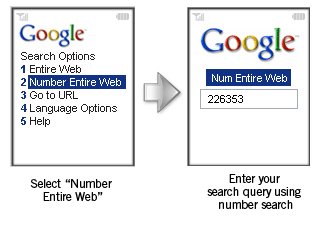A long time ago (in internet years), Google bought the domain
466453.com, which is the dotcom wordnumber for Google. Although Google didn't buy 466453 in other cc TLDs, typing in 466453.com within the internet networks of most countries will forward the user to the locally biased version of the Google homepage formatted for that nation/language.
Yahoo is a slightly different story. Yahoo bought 92466 in nearly every TLD - except for 92466.com, which is owned by WordDial - and also for a significant number of cc TLDs. All of
those are forwarded to Yahoo's error page - 'Sorry, the page you requested was not found' - that eventually forwards the user to the Yahoo.com homepage.
Currently, no major search engine provides the capability for mobile users to easily conduct (mobile optimized) searches in a different localized portal than the one the cell phone user (his/her IP) is currently located. Let's say you're in the U.S. and want to search Google Greece on your cell phone. What to do? Certainly there are solutions, such as bookmarking google.gr or multi-tapping 17 times (w/o the dot) for that long url. In the opposite situation - if you were in Greece - you could use
466453.com/ncr (an url that forces a 'no country redirect' to go to Google.com, which is considered the 'global' Google). But there is an even easier solution. DigitURL now provides access to Google of nearly every available language and nationality with numeric-tapping access. Simply go to
digiturl.com/466453, or better yet type in that Short DigitURL (466453) on their free downloadable mobile application, and choose the localized version of Google by the nationality you prefer. There aren't enough numbers on a keypad to enable accesskeys for each version of Google, but pressing the down button will get you to Google for many countries, including some that you probably never even heard of.
Google and Yahoo may not be seriously pondering that there are cell phone users who are thinking and researching in terms of global markets, or that a mobile user travelling by air through airports far away from home (i.e. in Iceland) would desperately want to surf on their favorite Google portal (i.e. Google Hungary). Google does provide a link on virtually every localized page (i.e.
Google Canada) to go to Google.com, but that is not exactly the solution to our scenario(s).
Yahoo, owing to the fact it owns 92466 in many cc TLDs, has the capability to develop a local unbiased mobile solution to enable a user to 'break out' of 'geotargeting.' Unlike with Google, Yahoo could provide its users with the capability to access Yahoo in any geography by typing in 92466 and the ccTLD. Certainly Google could develop an easy solution (or buy up 466453 in every ccTLD) and most likely has a more commonsense solution in the works. Until then, DigitURL, preferrably via its free mobile software, is
the easiest means for mobile-savvy Slovakians on holiday in Budapest to do some currency conversions the only way they know how - on google.sk.
Update1: At least one of Yahoo's 92466.[cctld] properties doesn't eventually get forwarded to Yahoo.com. 92466.cn redirects to Yahoo's typical 'Sorry, the page you requested was not found' error page in English, however suggests 'You may also want to try
cn.yahoo.com' and after a considerable wait actually forwards to that url.
Labels: 466453, DigitURL, geotargeting, WordDial

